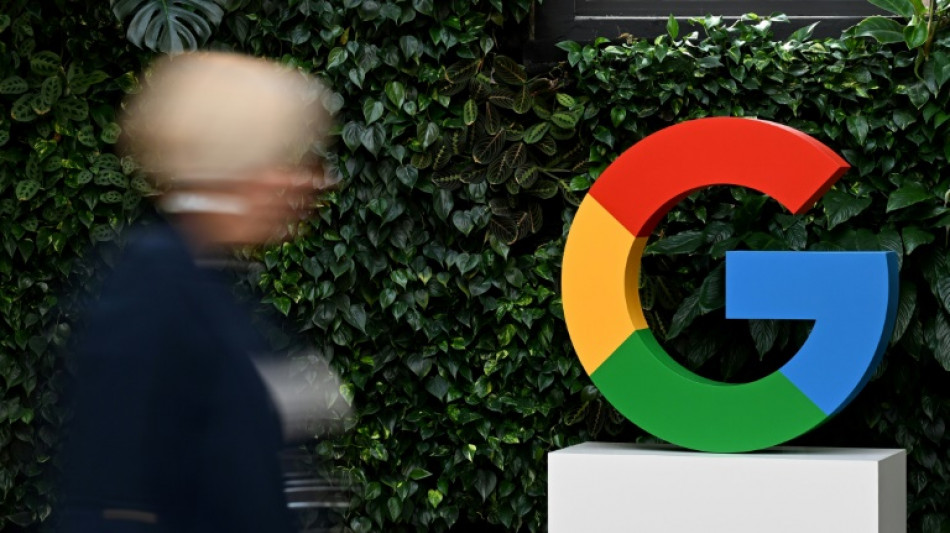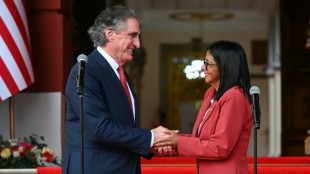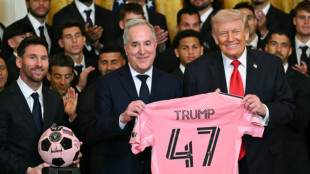
-
 Iran missile barrage sparks explosions over Tel Aviv
Iran missile barrage sparks explosions over Tel Aviv
-
US says Venezuela to protect mining firms as diplomatic ties restored

-
 Trump honors Messi and MLS Cup champion Miami teammates
Trump honors Messi and MLS Cup champion Miami teammates
-
Dismal Spurs can still avoid relegation vows Tudor

-
 Berger sets early pace at Arnold Palmer with 'unbelievable' 63
Berger sets early pace at Arnold Palmer with 'unbelievable' 63
-
Morocco part company with coach Regragui as World Cup looms

-
 Lens beat Lyon on penalties to reach French Cup semis
Lens beat Lyon on penalties to reach French Cup semis
-
El Salvador's Bukele holding dozens of political prisoners: rights group

-
 With Iran war, US goes it alone like never before
With Iran war, US goes it alone like never before
-
Spurs slip deeper into relegation trouble after loss to Palace

-
 European, US stocks back in sell-off mode as oil prices surge
European, US stocks back in sell-off mode as oil prices surge
-
Pete Hegseth: Trump's Iran war attack dog

-
 Celtics' Tatum could make injury return on Friday
Celtics' Tatum could make injury return on Friday
-
'Enemy at home': Iranian authorities tighten grip as war rages

-
 Bethell set for 'hell of a career', says England captain Brook
Bethell set for 'hell of a career', says England captain Brook
-
France coach Galthie slams Scotland for 'smallest changing room in the world'

-
 Medvedev arrives in Indian Wells after being stranded in Dubai
Medvedev arrives in Indian Wells after being stranded in Dubai
-
Trump fires homeland security chief Kristi Noem

-
 Mideast war risks pulling more in as conflict boils over
Mideast war risks pulling more in as conflict boils over
-
Wales' James Botham 'sledged' by grandfather Ian Botham after Six Nations error

-
 India hero Samson eyes 'one more' big knock in T20 World Cup final
India hero Samson eyes 'one more' big knock in T20 World Cup final
-
Britney Spears detained on suspicion of driving while intoxicated

-
 Grooming makes Crufts debut as UK dog show widens offer
Grooming makes Crufts debut as UK dog show widens offer
-
Townsend insists Scots' focus solely on France not Six Nations title race

-
 UK sends more fighter jets to Gulf: PM
UK sends more fighter jets to Gulf: PM
-
EU to ban plant-based 'bacon' but veggie 'burgers' survive chop

-
 Leagues Cup to hold matches in Mexico for first time
Leagues Cup to hold matches in Mexico for first time
-
India reach T20 World Cup final after England fail in epic chase

-
 Conservative Anglicans press opposition to Church's first woman leader
Conservative Anglicans press opposition to Church's first woman leader
-
Iran players sing anthem and salute at Women's Asian Cup

-
 India beat England in high-scoring T20 World Cup semi-final
India beat England in high-scoring T20 World Cup semi-final
-
Mideast war traps 20,000 seafarers, 15,000 cruise passengers in Gulf

-
 Italy bring back Brex to face England
Italy bring back Brex to face England
-
French policeman to be tried over 2023 killing of teen

-
 Oil prices rise, stocks slide as Middle East war stirs supply concerns
Oil prices rise, stocks slide as Middle East war stirs supply concerns
-
More flights take off despite continued fighting in Middle East

-
 Ukraine, Russia free 200 POWs each
Ukraine, Russia free 200 POWs each
-
Middle East war halts work at WHO's Dubai emergency hub

-
 Paramount's Ellison vows CNN editorial independence
Paramount's Ellison vows CNN editorial independence
-
US says attacks on alleged drug boats have spooked traffickers

-
 Dempsey returns as Scotland shuffle pack for Six Nations clash against France
Dempsey returns as Scotland shuffle pack for Six Nations clash against France
-
India pile up 253-7 against England in T20 World Cup semi-final

-
 Wary Europeans pledge 'defensive' military aid in Mideast war
Wary Europeans pledge 'defensive' military aid in Mideast war
-
Seven countries to boycott Paralympics ceremony over Russia: organisers

-
 UK's Crufts dog show opens with growing global appeal
UK's Crufts dog show opens with growing global appeal
-
PSG prepare for Chelsea clash with Monaco rematch

-
 Google opens AI centre as Berlin defends US tech reliance
Google opens AI centre as Berlin defends US tech reliance
-
Second Iranian ship nears Sri Lanka after submarine attack

-
 Portugal mourns acclaimed writer Antonio Lobo Antunes
Portugal mourns acclaimed writer Antonio Lobo Antunes
-
Union loses fight against Tesla at German factory


Europe seeks to break its US tech addiction
With President Donald Trump more unpredictable than ever and transatlantic ties reaching new lows, calls are growing louder for Europe to declare independence from US tech.
From Microsoft to Meta, Apple to Uber, cloud computing to AI, much of the day-to-day technology used by Europeans is American.
The risks that brings were hotly debated before Trump returned to power, but now Europe is getting serious -- pushing to favour European firms in public contracts and backing European versions of well-known US services.
As Europe faces Trump's tariffs, and threatens to tax US tech unless the two sides clinch a deal averting all-out trade war, there is a growing sense of urgency.
Tech sovereignty has been front and centre for weeks: the European Union unveiled its strategy to compete in the global artificial intelligence race and is talking about its own payment system to rival Mastercard.
"We have to build up our own capacities when it comes to technologies," EU tech chief Henna Virkkunen has said, identifying three critical sectors: AI, quantum and semiconductors.
A key concern is that if ties worsen, Washington could potentially weaponise US digital dominance against Europe -- with Trump's administration already taking aim at the bloc's tech rules.
That is giving fresh impetus to demands by industry, experts and EU lawmakers for Europe to bolster its infrastructure and cut reliance on a small group of US firms.
"Relying exclusively on non-European technologies exposes us to strategic and economic risks," said EU lawmaker Stephanie Yon-Courtin, who focuses on digital issues, pointing to US limits on semiconductor exports as one example.
- 'Buy European' push -
The data paints a stark picture.
Around two-thirds of Europe's cloud market is in the hands of US titans: Amazon, Microsoft and Google, while European cloud providers make up only two percent.
Twenty-three percent of the bloc's total high-tech imports in 2023 came from the United States, second only to China -- in everything from aerospace and pharmaceutical tech to smartphones and chips.
Although the idea of a European social media platform to rival Facebook or X is given short shrift, officials believe that in the crucial AI field, the race is far from over.
To boost European AI firms, the EU has called for a "European preference for critical sectors and technologies" in public procurement.
"Incentives to buy European are important," Benjamin Revcolevschi, chief executive of French cloud provider OVHcloud, told AFP, welcoming the broader made-in-Europe push.
Alison James, European government relations lead at electronics industry association IPC, summed it up: "We need to have what we need for our key industries and our critical industries to be able to make our stuff."
There are calls for greater independence from US financial technology as well, with European Central Bank chief Christine Lagarde advocating a "European offer" to rival American (Mastercard, Visa and Paypal) and Chinese payment systems (Alipay).
Heeding the call, EU capitals have discussed creating a "truly European payment system".
Industry insiders are also aware building tech sovereignty requires massive investment, at a moment when the EU is pouring money into defence.
In an initiative called EuroStack, digital policy experts said creating a European tech ecosystem with layers including AI would cost 300 billion euros ($340 billion) by 2035.
US trade group Chamber of Progress puts it much higher, at over five trillion euros.
- Different values -
US Vice President JD Vance has taken aim at tech regulation in denouncing Europe's social and economic model -- accusing it of stifling innovation and unfairly hampering US firms, many of whom have aligned with Trump's administration.
But for many, the bloc's values-based rules are another reason to fight for tech independence.
After repeated abuses by US Big Tech, the EU created major laws regulating the online world including the Digital Markets Act (DMA) and the Digital Services Act (DSA).
Much to the chagrin of US digital giants, the EU in 2018 introduced strict rules to protect European users' data, and last year ushered in the world's broadest safeguards on AI.
In practice, supporters say the DMA encourages users to discover European platforms -- for instance giving users a choice of browser, rather than the default from Apple or Google.
Bruce Lawson of Norwegian web browser Vivaldi said there was "a significant and gratifying increase in downloads in Europe", thanks in large part to the DMA.
Lawson insists it's not about being anti-American.
"It's about weaning ourselves off the dependency on infrastructure that have very different values about data protection," Lawson said.
Pointing at rules in Europe that "don't necessarily exist in the United States", he said users simply "prefer to have their data processed by a European company".
S.Leonhard--VB



